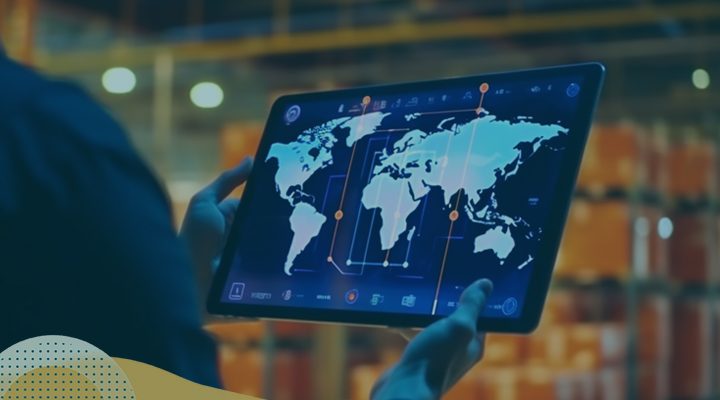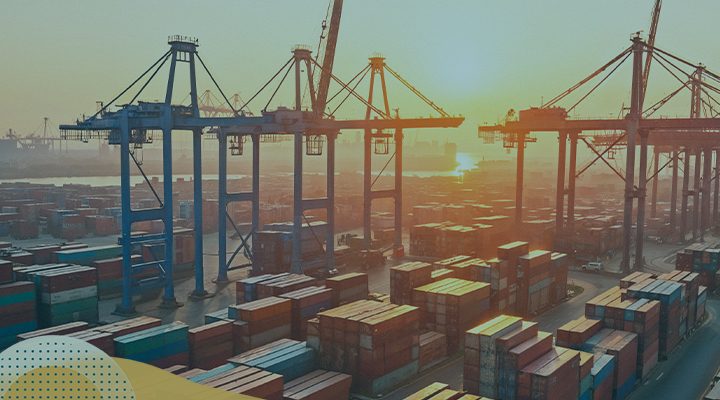Artificial intelligence (AI) is poised to transform many fields and operations, one of them being cross-border trade. Today, AI and ML technologies are streamlining operations, increasing transparency, and improving decision-making in Exim operations.
Across industries and geographies, AI applications are helping businesses reduce delays, cut costs, navigate complex compliance requirements, and optimize supply chains.
In this article, we’ll look at the applications of AI in global trade operations, the key drivers of adoption, and how you can use AI strategically to transform your business.
The Evolution of AI in Global Trade
Manual processes in traditional international trade operations make them inefficient and impact overall profitability.
The introduction of AI in global trade operations has brought intelligent automation to workflows. AI and ML-based tools are drastically reducing the time taken for tasks like invoice generation, supplier coordination, cargo tracking, and tariff classification.
Key drivers of AI adoption in global trade
Several forces are driving the adoption of AI in international trade:
- Complex supply chains: Modern Exim processes span multiple countries, entities, and teams. AI helps streamline and manage these intricate networks
- Cost efficiency: AI can take over repetitive and time-consuming tasks, which leads to lower operational costs and higher productivity
- Real-time visibility needs: AI allows for real-time monitoring and response, which is often required to avoid or manage disruptions in trade operations
Did You Know: McKinsey estimates that businesses that have adopted AI in global trade operations have decreased logistics costs by 15%.
Applications of AI in Export and Import Management
Here are some of the main applications of AI in global trade operations:
Automated documentation
AI tools can automate the extraction, validation, and management of data from various trade documents, including invoices, bills of lading, certificates of origin, customs declarations, etc.
This automation reduces the time and effort required to process these documents. Plus, it minimizes human errors that can often lead to delays, disputes, and additional costs.
By eliminating manual data entry and allowing real-time updates, AI accelerates customs clearance, helps companies comply with regulatory requirements, and improves overall supply chain visibility.
Trezix Tip: Autonomous AI agents in Trezix collaborate to classify HS Codes based on end-use, extract and verify supplier invoices, validate customs checklists, and process Bills of Entry across 20+ countries. With no-code output generation and document layouts, teams can use Trezix to generate hundreds of different document formats with speed and accuracy—no developer support required!
Predictive analytics for operational efficiency
Inventory management is one of the primary challenges for exporters and importers globally. While overstocking increases warehousing costs, understocking can disrupt supply chains.
AI-driven predictive analytics are helping businesses anticipate demand fluctuations more accurately. By analyzing trends and data, AI helps you plan shipments, control inventory, and manage working capital.
For example, your freight forwarder can use predictive analytics to forecast port congestion and reroute shipments proactively.
In addition, AI tools can study vast amounts of data to generate insights into supplier performance, risks, opportunities for improvement, etc. This helps teams make informed decisions, eventually reducing costs and minimizing waste.
Trezix Tip: Cross-border trade is no longer an L1 game of the lowest costs. One needs to consider the overall cumulative cost of operations, including delays and penalties. Solutions like Trezix help you stay ahead in this effort. With Trezix, you can reduce landed costs through dynamic duty optimization, FTA qualification, and tax recalculation.
Risk management and compliance
Governments and customs departments are also turning to AI in global trade management to identify red flags in shipments. This not only makes them more efficient but also accelerates the overall customs clearance process for all players.
For example, customs authorities use data analytics and machine learning to study historical patterns and create a decision model that predicts risky shipments.
Businesses can use these technologies to highlight and prevent any instances of non-compliance, saving them from potential penalties and more.
Trezix Tip: Automatic duty calculation with the Trezix platform helps teams manage disparate duties and changing tariffs across multiple countries with ease. No more losses due to compliance errors, no matter how many countries you trade with! Businesses worldwide are relying on Trezix to achieve compliance accuracy of over 95%.
How to Integrate AI in Your Business Operations
AI capabilities are vast, and often the tough question for any business is—where to start digitalization.
Start where you can achieve the most impact
Find the areas of your business that can benefit the most from AI-enabled tools, such as:
- Exim documentation: Automate Exim documentation to reduce delays, prevent errors, and improve efficiency
- Inventory management: Implement predictive analytics for inventory management to optimize stock levels and avoid shortages or overages
- Route optimization: Use AI tools for shipment planning and route optimization to minimize transportation costs and improve delivery times
Did You Know: A PwC study found that exporters and importers using predictive analytics for compliance management reduced penalties and legal costs by 30%
Partner with an expert
There is a plethora of tools in the market, and not all are suitable for every use case. Carefully assess the available solutions to pick the one that’s customizable to your specific needs and industry processes.
For example, an AI tool specifically designed for Exim management would support LC automation, customs and bank documentation, cross-border logistics, shipment tracking, regulatory compliance, and more.
Trezix Tip: Designed by Exim experts, Trezix is an intelligent global trade management solution with cutting-edge AI and ML capabilities to meet all your Exim ops needs in one integrated platform.
Transform Your Trade Operations With AI and Trezix
AI in global trade is redefining how goods move across borders, how documentation is managed, and how decisions are made. The key for businesses is to adopt AI in areas where it can drive the most value.
With the right platform and implementation strategy, AI can be a powerful enabler of smarter, faster, and more resilient trade operations.
Boost efficiency by 40% by eliminating fragmented, manual workflows with AI-powered global trade orchestration using Trezix. Book a meeting with us today.




